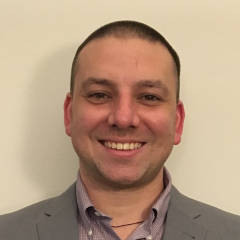“Predicting Human Performance and Systemic Physiology through Multi-Modal Sensing”
Thursday, Sept. 19
1:00 pm LAR 310
Abstract
Capturing, characterizing, and predicting how humans perform within systems (e.g., semi-autonomous vehicles, smart health care, bio-feedback virtual reality platforms) is essential to closing the gap between humans and technology to create a symbiotic relationship. However, human performance data causes many problems that lead to ineffective system frameworks because of subject-to-subject variability, limited experimental data, generic feature engineering, inflexible models, lack of model modularity for new sensors, and inappropriate metrics. My research seeks to advance human-centered autonomous systems through the perspective of human performance by leveraging systemic physiology, bio-signal processing, and predictive modeling, which allows us to map the state of the human to the state of the system.
In this talk, we will discuss how hypoxia cognitively impairs pilots and how to enhance semi-autonomous aeronautic systems by developing novel methods for detecting errors in human performance using physiological measures. The work presented will focus on three fundamental areas of human systems: 1) Preventing performance metrics from becoming misleading indicators over time; 2) Improving detection of the state of the human by leveraging our understanding of physiology to develop novel bio-signal processing methods; and 3) Developing predictive modeling structures to detect performance errors caused by hypoxia.
Biography
Nicholas J. Napoli is an assistant professor with the Department of Industrial and Systems Engineering (ISE) working in the Human Systems area. Utilizing his diverse expertise in physiology, data fusion, machine learning, and bio-signal processing, Dr. Napoli has secured funding as a principal investigator for human performance and human centered systems with the National Institute of Aerospace, NASA Langley, NASA Engineering Safety Center, and the U.S. Air Force. More specifically, Dr. Napoli’s research is focused on human performance and predictive sensing while leveraging human physiology and uncertainty modeling to develop new bio-signal processing algorithms and sensor fusion methodologies. This work will improve physiological systems by providing contextual meaning for understanding the state of the human, allowing machines to optimally evolve with the human. Through this interdisciplinary research, he aims to capture, characterize, and predict how humans and technology co-evolve as a system. These applications can range from advanced neuroprosthetics, operator control rooms, remote physiological monitoring, and bio-feedback virtual reality platforms.
Prior to joining UF, he worked at the University of Virginia’s (UVA) Link Lab as a Research Scientist within the Department of Electrical and Computer Engineering. Dr. Napoli received his Ph.D. in Systems and Information Engineering from UVA, and his M.S. and B.S. in Electrical Engineering, as well as his B.S. in Applied Physiology from the University of Miami. Dr. Napoli was the recipient of a 2017 Achievement Rewards for College Scientists (ARCS) Foundation Fellowship award for Advancing Science in America, the 2015 Air Force Research Laboratory Repperger Fellowship in the 711th Human Performance Wing, UVA’s 2016 Jefferson Presidential Fellowship in Data Science, and the 2015 Virginia Center for Health Innovation Fellowship. Additionally, he is a two-time awardee of NASA’s Virginia Space Grant Consortium Fellowship (2015–2016).

